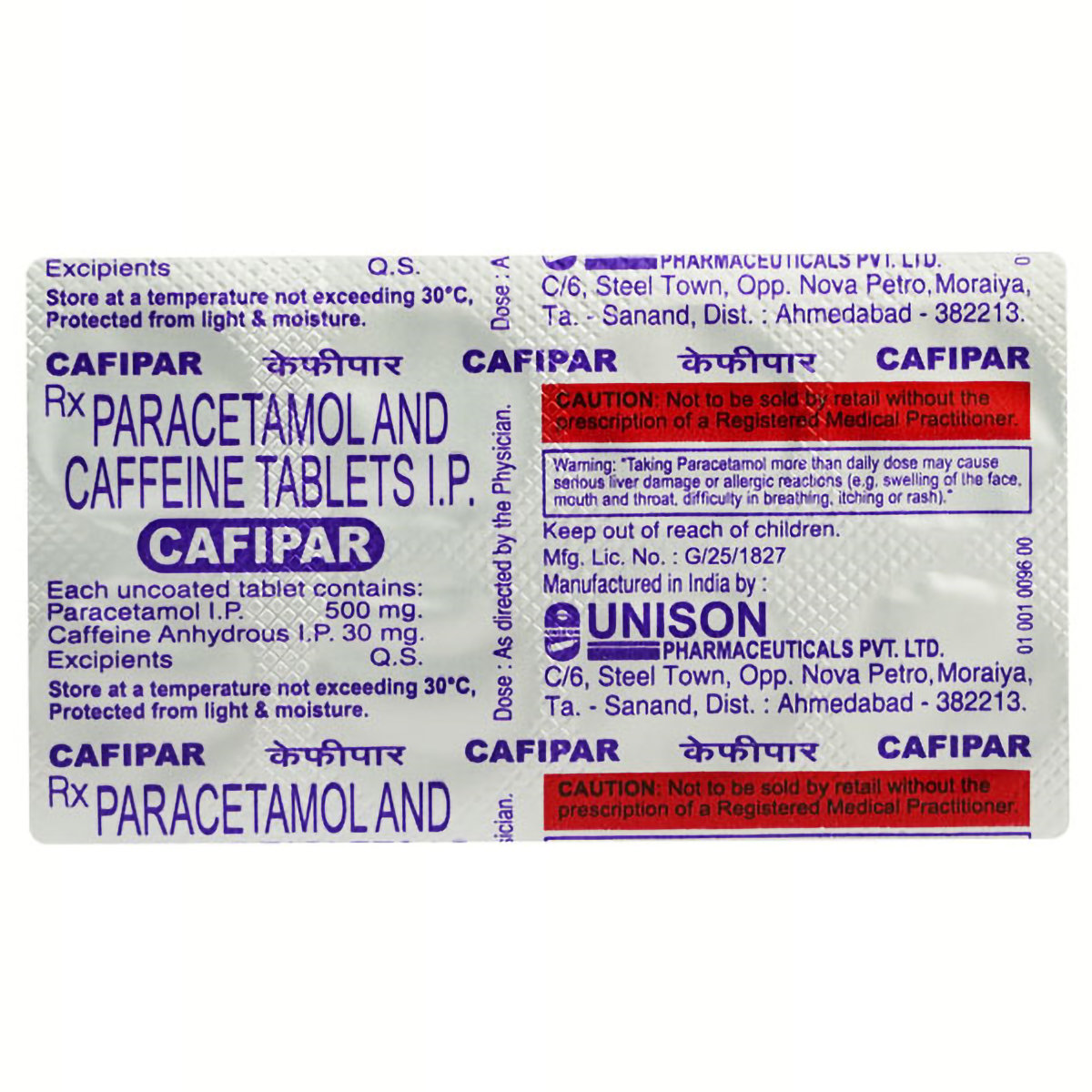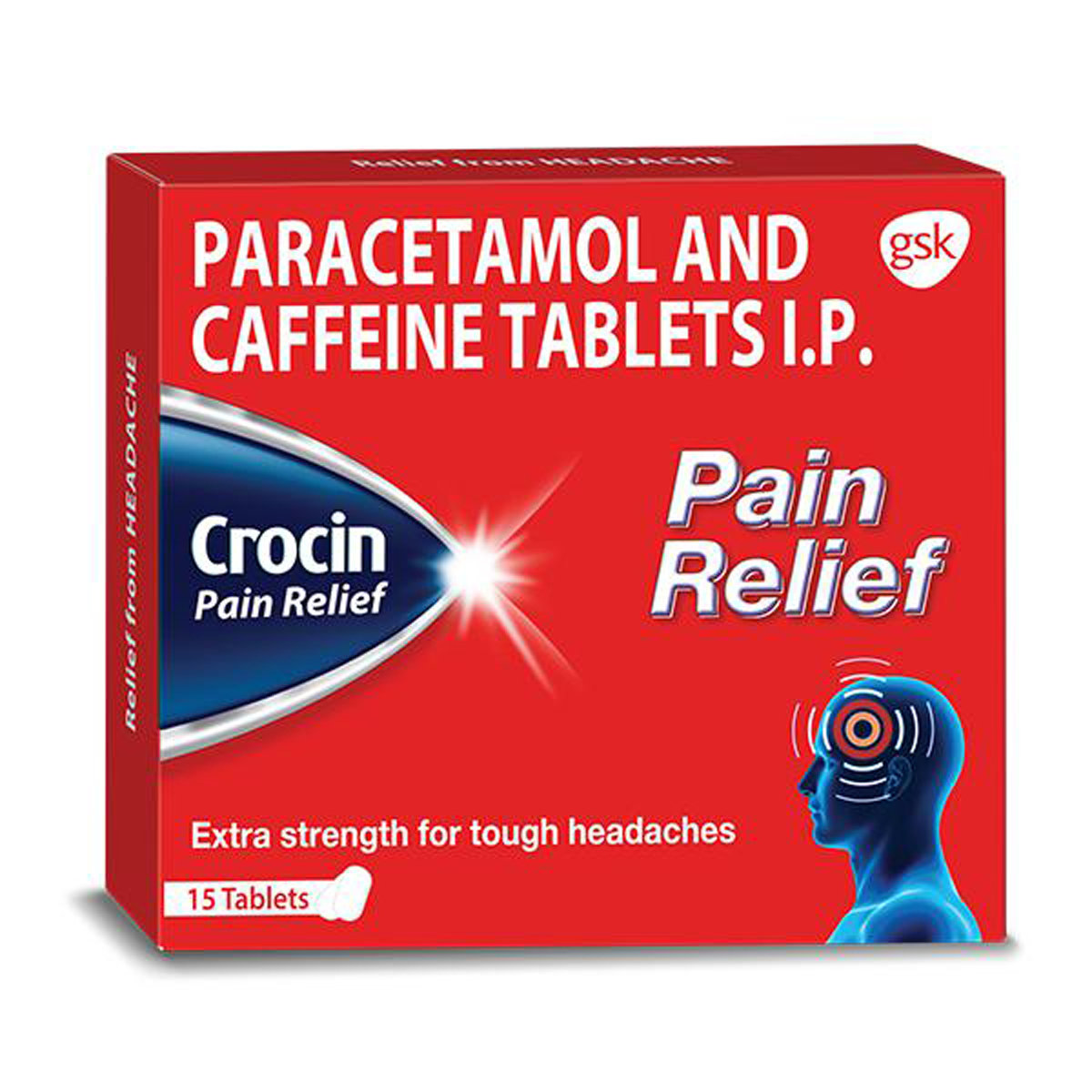Paracetamol+caffeine
About Paracetamol+caffeine
Paracetamol+caffeine is used to treat mild to moderate pain, including headache, backache, migraine, rheumatic and muscle pain, toothache and period pain. Pain is caused by the activation of pain receptors due to the release of certain chemicals or enzymes.
Paracetamol+caffeine contains paracetamol and caffeine. Paracetamol inhibits the release of these enzymes and alleviates pain. Caffeine increases the efficacy of paracetamol by improving its absorption, thereby prolonging analgesic action.
The common side effects of Paracetamol+caffeine include agitation, nervousness, and insomnia. Everyone does not need to experience the above side effects, as they vary for each person depending on their health, underlying conditions, age, weight, and gender. In case of any discomfort, speak with a doctor.
Do not take Paracetamol+caffeine if you're allergic to any ingredient in it. Paracetamol+caffeine is not recommended for use during pregnancy or breastfeeding. Ask your healthcare professional for advice if you have any concerns. Do not use Paracetamol+caffeine in more than the prescribed doses or for a longer duration, as it may cause adverse effects.
Uses of Paracetamol+caffeine
Medicinal Benefits
- Paracetamol+caffeine is a combination medication containing paracetamol (acetaminophen) and caffeine.
- Paracetamol+caffeine effectively treats mild to moderate pain, including headache, backache, migraine, rheumatic and muscle pain, toothache and period pain.
- On the other hand, it also relieves discomfort associated with colds, influenza, and sore throats, and helps reduce fever.
- Paracetamol inhibits the release of these enzymes and alleviates pain. It also has an antipyretic effect, reducing body temperature in cases of fever.
- Caffeine increases the efficacy of paracetamol by improving its absorption, thereby prolonging analgesic action.
Directions for Use
- Take Paracetamol+caffeine with or without food as advised by your doctor.
- Follow your doctor's instructions on the dosage and timing of this medication.
- Swallow Paracetamol+caffeine as a whole with a glass of water.
- Do not crush, break, or chew it.
Storage
Side Effects of Paracetamol+caffeine
- Insomnia
- Nervousness
- Restlessness
- Nausea
- Increased Heart Rate
- Agitation
- Nervousness
Drug Warnings
- Consult your doctor immediately if you have any allergic reactions such as skin rash, swelling of the face/lips/tongue/throat, wheezing, or shortness of breath.
- Do not take it if you have any known allergy to paracetamol (acetaminophen) or caffeine.
- People with kidney, liver, alcohol dependence, heart disease, or persistent headaches should avoid taking Paracetamol+caffeine unless instructed by the doctor.
- Inform your doctor if you are taking any other prescribed or over-the-counter medications before taking this medicine.
- Do not increase your dose or duration of the medicine without consulting the doctor.
Drug Interactions
Drug-Drug interactions: Paracetamol+caffeine may interact with other analgesics (ibuprofen, Aspirin), muscle relaxants (tizanidine), medicines used to treat nausea(metoclopramide or domperidone), and cholesterol medications (cholestyramine).
Drug-Food interactions: Avoid foods containing caffeine, such as coffee, tea, chocolate, or cola.
Drug-Disease interactions: Paracetamol+caffeine may have interactions with hepatic failure (liver diseases), alcoholism, cardiac diseases (heart problems), hypertension, peptic ulcer, and renal dysfunction (kidney diseases).
Drug-Drug Interactions Checker List:
Safety Advice
Alcohol
unsafeParacetamol+caffeine is unsafe with alcohol as it may cause gastrointestinal side effects such as abdominal pain and vomiting.
Pregnancy
consult your doctorParacetamol presnet in Paracetamol+caffeine is a Category B pregnancy medicine, but caffeine use is limited during pregnancy. So, it should be used during pregnancy only if the doctor has prescribed it.
Breast Feeding
consult your doctorParacetamol+caffeine should not be used in nursing mothers unless clearly necessary. So, inform your doctor if you are a nursing mother.
Driving
safe if prescribedParacetamol+caffeine may not affect your ability to drive or operate machinery.
Liver
cautionParacetamol+caffeine is to be taken with caution, especially if you have a history of liver diseases such as alcoholic liver disease. The dose may have to be adjusted by your doctor.
Kidney
cautionParacetamol+caffeine is to be taken with caution, especially if you have a history of kidney diseases. You may require dose adjustments based on your health condition.
Children
consult your doctorThe dose of Paracetamol+caffeine needs to be adjusted, and its use should be recommended by a child specialist only.
Habit Forming
Diet & Lifestyle Advise
- Get adequate sleep as resting the muscles can help in reducing inflammation and swelling.
- Acupuncture, massage and physical therapy may also be helpful.
- Eat foods rich in antioxidants such as berries, spinach, kidney beans, dark chocolate, etc.
- Foods containing flavonoids such as soy, berries, broccoli, grapes and green tea help in reducing inflammation.
- Maintain a healthy weight by performing regular low-strain exercises and eating healthy food.
- Practice relaxation techniques that help to calm down the mind and reduce pain levels.
- Avoid smoking and alcohol consumption.
Special Advise
- Take rest whenever required, to ease the pain.
- Adequate intake of fluids can prevent dehydration.
Patients Concern
Disease/Condition Glossary
Pain: Pain is a commonly used term to describe any unpleasant feeling or discomfort. It occurs due to nerve damage (in cases of backache, toothache, or muscle pain) or persistent stimulation (in cases of headache or migraine). Pain may vary from mild to severe, depending on the underlying condition.
FAQs
Paracetamol+caffeine belongs to the class of analgesic medication. It is primarily used to treat mild to moderate pain, including headache, backache, migraine, rheumatic and muscle pain, toothache and period pain.
Paracetamol+caffeine contains paracetamol (acetaminophen) and caffeine. Paracetamol inhibits the release of these enzymes and alleviates pain. Caffeine increases the efficacy of paracetamol by improving its absorption, thereby prolonging analgesic action. Paracetamol also has an antipyretic effect and can reduce body temperature in cases of fever.
The dose of Paracetamol+caffeine depends on your condition and severity. Consult a doctor to know the exact dose and duration.
Take the missed dose as soon as you remember, if the next dose is not due within a few hours. Do not double the next dose. Take your next doses at the fixed time.
If there is an overdose, you may experience signs of liver damage such as nausea, vomiting, loss of appetite, rash, or dark urine. Consult a doctor immediately if you have any discomfort.
Paracetamol+caffeine is recommended to use not more than 2 to 3 days per week. Prolonged use may lead to medicine-overuse (rebound) headaches.





